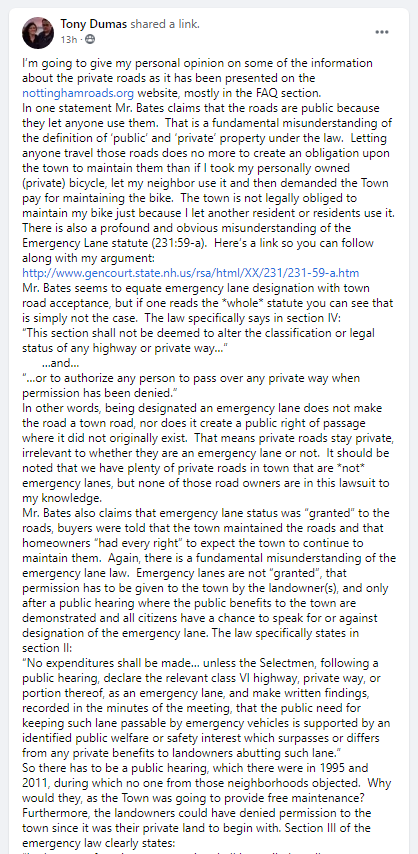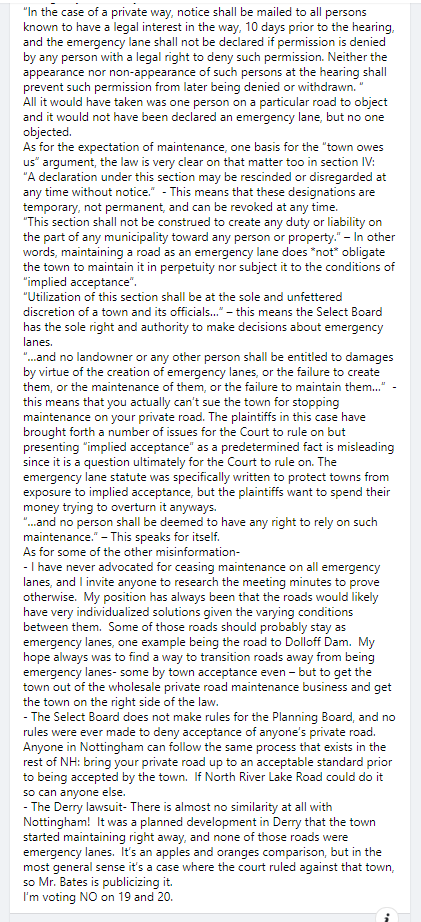 |
|
| Home | |
| Why Vote Yes? | |
| History of the Roads | |
| Fearmongering | |
| Derry's Losing Lawsuit | |
| 1st Rebuttal to Dumas | |
| 2nd Rebuttal to Dumas | |
| 3rd Rebuttal to Dumas | |
| FAQ | |
| About |
Rebuttal to Selectman Dumas 2nd StatementSelectman Dumas has published a lengthy critique of the information provided for voters at www.nottinghamroads.org. As the necessary response will need to be similarly lengthy, I'm going to break it up into several posts covering one subject at a time so that it will be easier for readers to follow and for the subsequent discussion of the issues to stay focused. Readers should understand that Selectman Dumas' comments are not in his official capacity of being a selectman. He is speaking just for himself, not the Board of Selectmen. The Board of Selectmen is divided on these issues. Selectman Morin, for example, supports voting yes on Warrant Articles #19 and #20. Selectman Dumas is doing the voters a great service by explaining his reasons for exposing the Town to litigation and causing citizens to have to petition the voters to have the Board of Selectmen's actions overturned. Voting yes on Warrant Articles #19 and #20 will solve these problems which Selectman Dumas has had a major hand in creating. The Rainbow Lake CaseSelectman Dumas dismisses what happened when the Town of Derry in 2001 did the same thing Nottingham is doing, which is to cease maintenance on roads the town had maintained for decades due to an erroneous decision that the roads were private. As in Nottingham, this caused the Town of Derry to get sued. Rockingham Superior Court ruled that the Town was wrong, the roads were public, and the Town had to continue to maintain them. Selectman Dumas thinks these cases are "apples and oranges" and have "almost no similarity at all with Nottingham!" because Rainbow Lake was "a planned development" and none of the roads had been designated "Emergency Lanes." Selectman Dumas does not appear to understand why Derry lost this case. That the development was planned and that the roads were not Emergency Lanes had nothing to do with the court's ruling. The critical issue in the ruling was the fact that the Town had been maintaining the roads for over 40 years. See the details for yourself where you can read the court's reasoning for its verdict. Public Access to the RoadsAs I pointed out in my prior rebuttal of Selectman Dumas, he is presenting to the voters an erroneous definition about the differences between public and private roads. His latest comments demonstrate additional errors in his understanding of those differences. In his descriptions of what he understands a "private" road to mean, he has told people "...the land is owned by the property owners on those roads and not by the Town. They can close off the road any time they like want, because they can. It's *their* land." This has caused people to think these roads are closed off to the public. Many people have asked whether they can drive on these roads, park on them, and walk on them. The answer to that is, yes you can. In his rebuttal, Selectman Dumas misrepresents this answer to be an explanation of why the roads are public and uses that misrepresentation to further confuse the voters. The explanation of why the roads are public is given in this summary of NH state law regarding the criteria by which roads are accepted as public roads. Selectman Dumas apparently wants to draw attention away from this and the fact that he is wasting taxpayers' money by having the Town's law firm defend the Board of Selectmen's meritless case in court. Emergency Lane StatusSelectman Dumas claims that I "equate emergency lane designation with town road acceptance" and goes on to accuse me of "a profound and obvious misunderstanding of the Emergency Lane statute." As with the issue about public access to the roads, Selectman Dumas misrepresents the issue about Emergency Lane status, pretending that I have equated it was road acceptance. Again, the explanation of why the roads are public is given in this summary of NH state law regarding the criteria by which roads are accepted as public roads. Emergency Lane status and the Emergency Lane statute are irrelevant to these criteria. However, with respect to the history of these roads the Emergency Lane designation plays an important part in understanding the story of why we are in the situation we're in. Selectman Dumas points out that the Emergency Lane statute says "This section shall not be deemed to alter the classification or legal status of any highway or private way..." thinking that this is a valid counter-argument. It isn't. The problem with it is that these roads achieved implied acceptance status long before 1995, which is the year they were declared Emergency Lanes. Some of these roads, such as Seamans Point, date back to the early 19th century. They were supposed to have been declared public back in 1968 (See Hersh v. Plonski, 938 A. 2d 98 - NH: Supreme Court 2007 "A public highway may be created: ... (3) through twenty years of use by the public before 1968....") For the roads built later, they all met two criteria, either of which gave them implied acceptance as public roads long before they were declared Emergency Lanes.
So, Selectman Dumas lengthy discussion about Emergency Lanes is just a distraction from the issue. The only reason Emergency Lane status is relevant here is because, as Selectman Dumas put it, the Board of Selectmen was "attempting to exercise its discretion under the Emergency Lane Law (RSA 231:59-a) to cease maintenance due to the fact that most of the roads in question no longer qualified to be ELs." Past Boards of Selectmen invoked the Emergency Lane statute as a convenient cover for the Town to continue doing what it had done for decades. This kept the residents on those roads happy, as they continued to receive the road maintenance that the Town was obligated to perform, and it kept the voters happy because they did not have to concern themselves about this issue. Now, Selectman Dumas has led the Board of Selectmen to disregard NH state law and NH Supreme Court rulings and to overturn half a century of Town management, embroiling the Town in a lawsuit and a citizens petition to overturn the Board of Selectmen's decisions. It's easy to see why prior Selectmen took a wiser course of action and let the sleeping dog lie. On June 8 Nottingham's voters can get the Town in compliance with NH state law and stop the waste of taxpayers' money on the Town's meritless legal case by voting yes on Warrant Articles #19 and #20. Selectman Dumas' Statement:

|